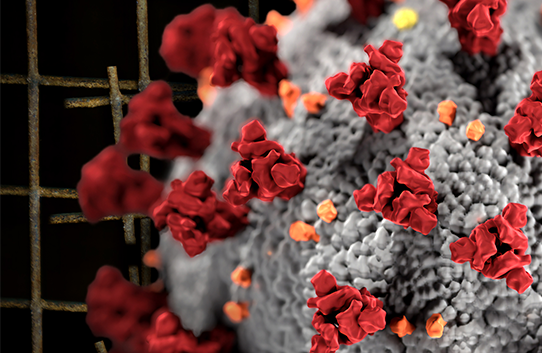
What have we learnt two years on from COVID-19?
The pandemic has left the world reeling, but is it enough to make long-term change in the way we treat animals and nature?
Two years ago, the devastation of COVID-19 was just starting to reach our shores with the World Health Organisation declaring the virus a global pandemic. With this announcement came the first of over 160,000 deaths in the UK to date and over 6,000,000 globally[1]. The world stopped.
Back then, we weren’t to know the extent of the catastrophic effects it would bring to people’s lives, their health and the economy. Nor did we know that almost 500 million people would be infected with COVID-19 in just two years[2].
One thing, however, quickly became clear. This was another zoonotic disease spread due to appalling animal welfare conditions[3][4][5].
In live animal markets, disease runs rampant. Animals of various species, both wild and domesticated, are stacked on top of one another in filthy cages. Cramped and dirty, these conditions allow a mixing of faeces, urine, blood, and ultimately pathogens, which provides the perfect breeding ground for deadly viruses to spread to human populations[6].
COVID-19 has also been known to jump back to animals from humans as seen in zoo-based gorillas[7], tigers[8], hyenas[9] and hippos[10], which have all tested positive for the virus. Worryingly, the virus can then mutate within the animal and spread back to humans as a different variant, potentially compromising the efficacy of vaccines[11]. This has been seen in mink fur farms and sadly resulted in over 20 million minks culled[12].
Despite the widespread attention the pandemic received, there is still a distinct lack of awareness about the link between our increasingly unnatural relationship with animals and the spread of zoonotic disease. In fact, 36% of people surveyed in Vietnam, China, Myanmar, Thailand and the US say that if local wildlife markets were to close, they would simply buy wildlife products overseas instead. 10% even said they consume the same or more wildlife products now than before the pandemic[13].
Closer to home, it is still not widely understood that factory farms have been the origin of a number of infectious zoonotic diseases such as bird flu and swine flu[14][15]. Despite this, still over 70% of UK farmed animals are kept in these cruel, intensive systems[16].
However, with COVID-19 widely thought to have emerged from a live-animal market, the recent pandemic must serve as a wakeup call that forces us to readdress our relationship with animals.
85% of people back efforts to close high-risk markets selling wildlife, while 88% want to see the end of deforestation as root drivers of zoonotic disease outbreak13. People have also noticeably become kinder to one another[17], and environmental pollution has reduced[18]. Additionally, the Environment Secretary recently confirmed that £200 million would be invested in fighting zoonotic diseases in the UK[19].
The pandemic has been a learning curve for the world. The way we treat others, animals and the planet is changing. But with 75% of all emerging infectious diseases originating in animals[20], we must call on governments and decision-makers to ensure that COVID-19 is a turning point in improving our relationship with animals and nature.
Please sign our petition to demand a better world for animals and humans alike; because when they suffer, we suffer.
[2] https://news.un.org/en/story/2022/03/1113632
[3] https://zenodo.org/record/6299600#.YjHmdnrP02w
[4] https://zenodo.org/record/6291628#.YjHmeHrP02w
[5] https://www.researchsquare.com/article/rs-1370392/v1
[6] https://www.ifaw.org/uk/people/opinions/preventing-future-pandemics-act-end-wildlife-trade
[7] https://www.theguardian.com/us-news/2021/sep/11/gorillas-coronavirus-covid-atlanta-zoo
[8] https://www.bbc.co.uk/news/world-us-canada-52177586
[9] https://www.theguardian.com/world/2021/nov/06/hyenas-at-denver-zoo-catch-covid-in-world-first
[10] https://www.bbc.co.uk/news/world-europe-59516896
[11] https://www.ecdc.europa.eu/sites/default/files/documents/RRA-SARS-CoV-2-in-mink-12-nov-2020.pdf
[12] https://www.furfreealliance.com/covid-19-on-mink-farms/
[13] https://c402277.ssl.cf1.rackcdn.com/publications/1487/files/original/WWF_covid_19_one-year_later_UPDATE.pdf?1620823070
[14] https://www.ciwf.org.uk/media/22780/swine_flu_report_05_05_2009.pdf
[15] https://www.ciwf.org.uk/media/97335/intensive_poultry_production_and_avian_influenza.pdf
[16] https://www.ciwf.org.uk/factory-farm-map/
[17] https://www.independent.co.uk/life-style/covid-kindness-study-pandemic-nicer-b1802092.html
[18] https://link.springer.com/article/10.1007/s13762-020-03021-3
[19] https://www.gov.uk/government/news/200-million-investment-to-fight-zoonotic-diseases?utm_medium=email&utm_campaign=govuk-notifications-topic&utm_source=cb92ccf7-065c-4937-9dc4-2a35a608c34a&utm_content=weekly
[20] https://www.unep.org/news-and-stories/statements/preventing-next-pandemic-zoonotic-diseases-and-how-break-chain


